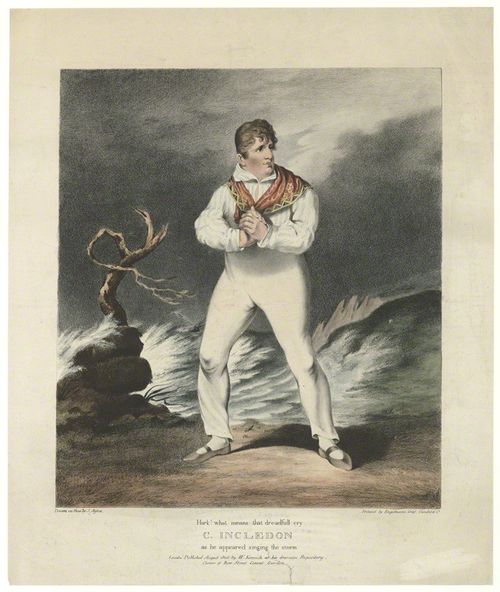Annotation:Death of Admiral Benbow: Difference between revisions
No edit summary |
No edit summary |
||
| (3 intermediate revisions by 2 users not shown) | |||
| Line 1: | Line 1: | ||
---------- | |||
---- | {{TuneAnnotation | ||
|f_tune_annotation_title= https://tunearch.org/wiki/Annotation:Death_of_Admiral_Benbow > | |||
'''DEATH OF ADMIRAL BENBOW.''' English, Air (3/4 time). G Major. Standard tuning (fiddle). One part. Glasgow publisher James Aird noted "sung by Incledon" after the title, a reference to Charles Incledon [http://en.wikipedia.org/wiki/Charles_Incledonin] (1763-1826), one of the most famous tenors of his age noted particularly for his rendering of ballads and performances in the theatre. | |f_annotation='''DEATH OF ADMIRAL BENBOW.''' AKA and see "[[Admiral Benbow]]." English, Air (3/4 time). G Major. Standard tuning (fiddle). One part. Glasgow publisher James Aird noted "sung by Incledon" after the title, a reference to Charles Incledon [http://en.wikipedia.org/wiki/Charles_Incledonin] (1763-1826), one of the most famous tenors of his age noted particularly for his rendering of ballads and performances in the theatre. | ||
[[File:incledon.jpg| | [[File:incledon.jpg|500px|thumb|left|Charles Incledon]] | ||
His ''pièce de résistance'' was George Alexander Stevens' "The Storm" or "[[Cease Rude Boreas]]," a song that described a storm at sea, which Incledon often performed with a backdrop of a stormtossed ship in distress. Incledon knew of what he sang, for as a youth he served in the Navy for sevearl years, where he took part in the Battle of the Saintes (1782) against the French fleet. See also notes for "[[annotation:Admiral Benbow]]" and "[[Annotation:Benbow the Brother Tar]]" for more. | His ''pièce de résistance'' was George Alexander Stevens' "The Storm" or "[[Cease Rude Boreas]]," a song that described a storm at sea, which Incledon often performed with a backdrop of a stormtossed ship in distress. Incledon knew of what he sang, for as a youth he served in the Navy for sevearl years, where he took part in the Battle of the Saintes (1782) against the French fleet. See also notes for "[[annotation:Admiral Benbow]]" and "[[Annotation:Benbow the Brother Tar]]" for more. | ||
|f_source_for_notated_version= | |||
|f_printed_sources= Aird ('''Selection of Scotch, English, Irish and Foreign Airs, vol. 5'''), Glasgow, 1797; No. 114, p. 44. | |||
|f_recorded_sources= | |||
|f_see_also_listing= | |||
}} | |||
Glasgow, 1797; No. 114, p. 44. | |||
Latest revision as of 02:13, 1 April 2023
X:1 T:Death of Admiral Benbow. as Sung by Incledon. M:3/4 L:1/8 R:Air Q:"Moderato" B:James Aird – Selection of Scotch, English, Irish and Foreign Airs, vol. 5 B:(Glasgow, 1797, No. 114, p. 44) Z:AK/Fiddler’s Companion K:G G>D|G>A B2d2|(d>cB2) (GA)|B2 (cB) (AG)|G4 G>D| G>A B2d2|(dc B2) AG|B2 (cB) (AG)|G4 FG| A2E2 (AG)|F2D2 GD|G2 GA BG|!fermata!c4{Bdc}G| (G>A) B>c d>e|d>c B2 (GA)|(Bc/d/) (cB) (AG)|G4||
DEATH OF ADMIRAL BENBOW. AKA and see "Admiral Benbow." English, Air (3/4 time). G Major. Standard tuning (fiddle). One part. Glasgow publisher James Aird noted "sung by Incledon" after the title, a reference to Charles Incledon [1] (1763-1826), one of the most famous tenors of his age noted particularly for his rendering of ballads and performances in the theatre.

His pièce de résistance was George Alexander Stevens' "The Storm" or "Cease Rude Boreas," a song that described a storm at sea, which Incledon often performed with a backdrop of a stormtossed ship in distress. Incledon knew of what he sang, for as a youth he served in the Navy for sevearl years, where he took part in the Battle of the Saintes (1782) against the French fleet. See also notes for "annotation:Admiral Benbow" and "Annotation:Benbow the Brother Tar" for more.

